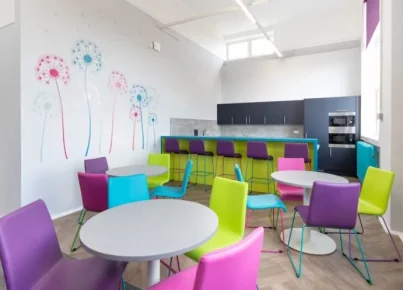No one goes into their first principalship thinking, “I just want to be a mediocre principal.” No, you want to be a successful education administrator, who is recognized for their contributions to the profession. If this is true, then there are a few things that you should know. Some are common sense, and because of this, we take their importance for granted. To help you realize your goals, I want to give you the 8 keys to becoming an effective principal.
The teacher turnover rate is something that you own. If there is a high rate of teacher turnover in your school building each year, then you have a significant problem. If you don’t correct this, you will have difficulty convincing the best teachers to work in one of your classrooms. Your school’s high teacher turnover will scare them away like an apparition in a Stephen King movie. Only the teachers who have no other options will even entertain giving your school a try.
You need to take responsibility for the environment in which your teachers work. You are in charge of creating a culture where teachers feel safe, appreciated, and supported. It doesn’t matter if your school is located in the toughest neighborhood in the Bronx, Compton, New Orleans or Chicago; if you take the job, the buck stops with you. No one wants to hear excuses or see you play the blame game. If you follow my advice, your school will be a place where quality teachers compete for a chance to work. Remember having a quality teacher in each classroom is a foundational step to being an effective principal.
Don’t be intimidated by knowledge gaps. As a principal, there will be things that you don’t know or don’t understand completely. I know that everyone expects you to know everything on day one, but don’t put this kind of pressure on yourself. It takes effective principals years to learn about all of the nuances of the position, and all of the laws, policies, strategies, and methods that are at their disposal.
Also, most of the things that you don’t know can only be learned with experience and time. If you are in the position long enough, you will be able to say that you have seen it all. Just trust that what you have learned as a pre-service/in-service teacher and in your education administration program is sufficient to start. Once you get started, create a professional development plan that will help you acquire the skills and knowledge that you believe you lack. You will be just fine.
Communication is key. To be an effective principal, you have to learn how to communicate effectively. To begin the journey (it takes time to develop the skill) of being a good communicator, you only have to remember one rule; the foundation of good communication is seeking to understand and then seeking to be understood. When doing so, you can frame the conversation, but then give them a chance to express themselves before you chime in.
For instance, if a student is sent to your office for disrupting the class, explain why they are in your office, and what they are being accused of. Then allow them to tell their side of the story, and when it’s your time to speak, ask clarifying or follow up questions, and then use your part of the conversation to discuss expectations, consequences, preventive measures, etc. Even if you have to suspend the student, they will feel as though they were treated fairly.
Its ok to play devils advocate when mediating conflicts. Parents, teachers, students, etc. will all come to you complaining about one another. They will tell you their side of the story, but as we all know, there are three sides to situation, person A’s perspective, person B’s perspective, and the truth, which is sometimes in the middle. Bridge this gap by playing devil’s advocate, and playing the role of the other combatant. In this way, you can allow the other person to understand what the other person’s perspective may be and how they may be feeling. Sometimes forcing others to empathize with the plight of the person with whom they have a conflict with forces them to see the issue in another light.
Cultivate a school culture where all students are expected to reach their potential. As a principal, you should cultivate a school culture where everyone succeeds, up to their own potential and learning capacity. In this culture, teachers are expected to add value to all their students, helping them to demonstrate academic growth throughout the school year. But, how can you gauge student growth and teacher efficiency? By utilizing value-added assessment.
Value-added assessment Is designed to ensure that students are learning, by comparing their current level of academic performance against their previous level of academic performance. This type of assessment focuses on student growth, rather than comparisons to other students or accomplishments of specific achievement levels. Value-added assessment provides an objective way of evaluating teachers and is less about who a student is and more about what goes on in the classroom. With this info, you can create reasonable conclusions about each students learning potential, using student outcomes as your compass. Every decision that you make should be made with one guiding principle; how will this affect my students?
Always be organized and prepared. I know that this seems like common sense, but I cannot stress the importance of organization and preparation enough. Being organized and prepared is a prerequisite for all professionals. If you are not, it will cost you time, energy, and respect. People who are not organized, are inefficient, as it takes them much longer to complete tasks or track down files and documents.
For instance, a teacher needs travel requisition form (yes, some districts still use paper) to book a flight to a national conference, but you misplaced the forms. What could have been a 5-second task, will now take more time as you need to commander more from the central office, as the form is in triplicate, so you can’t just print out more.
Another example would be failing to thoroughly prepare for a principal’s meeting at your district’s central office as you believed that it would not be necessary. The other principals used the agenda your Assistant Superintendent’s emailed the week before to anticipate the talking points and were prepared to chime in. After the Assistant Superintendent introduced each item, he asked for thoughts from the attendees. Everyone, except you, was able to add something useful and timely to the conversation. You should have been more prepared.
Become the master of data-based decision making. Being able to analyze data and use it as part of your decision-making process is one of those skills that separate good principals from great ones. Data-based decision making can be defined as the process of acquiring and analyzing data, then using it to make decisions. For example, expanding the use of a piloted learning tool to an entire grade level, school or school district only if it can be shown by pre- and post-assessments to improve student mastery.
Provide high-quality professional development for your staff. You want to have the best team in the district, and I assume that you have hired qualified teachers, so you are all good there. However, the key to continued student success is providing your teachers with high-quality professional development. Since you have seen your teachers in action, you know what skills they possess, what skills that need to acquire, and which skills need a little retooling or updating. Just make sure you choose professional development providers who are highly effective and who have data to back this up.
What did I miss?




